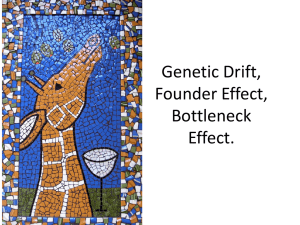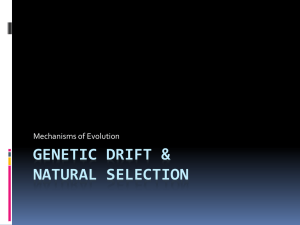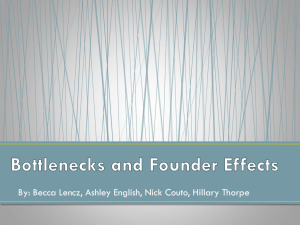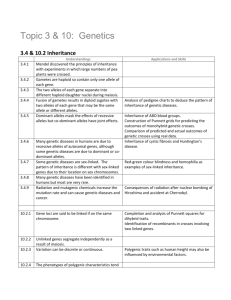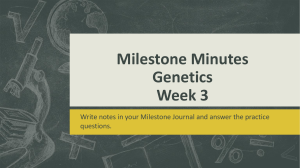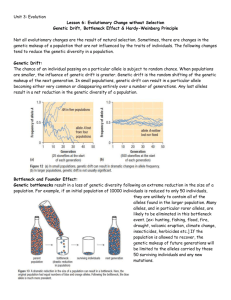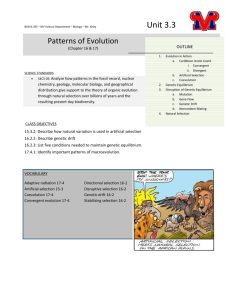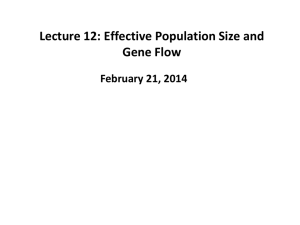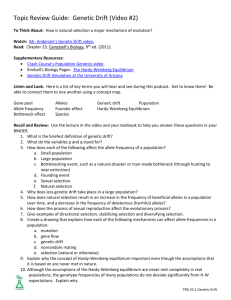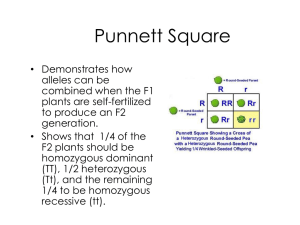Population genetics
advertisement
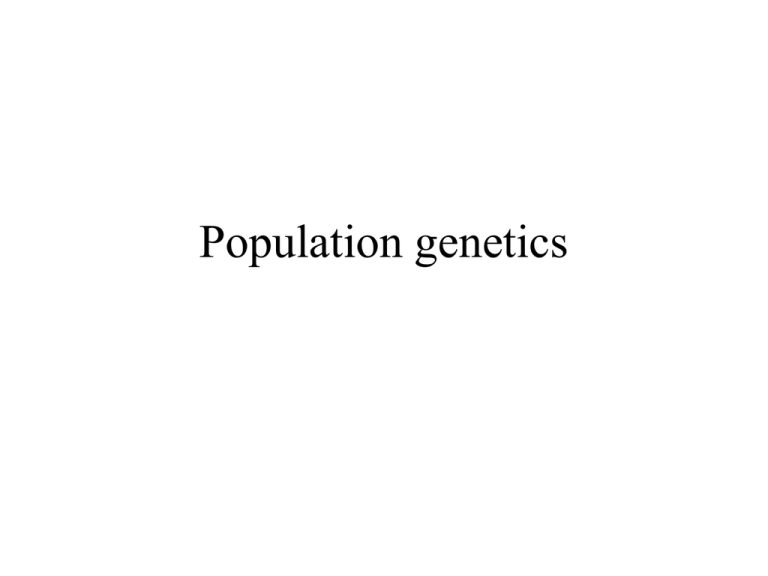
Population genetics Vocabulary Find the definition for: Microevolution Average heterozygosity Geographic variation cline Genetic drift • Chance events cause allele frequencies to fluctuate unpredictably from one generation to the next , especially in small populations In each generation, some individuals may, just by chance, leave behind a few more descendents (and genes, of course!) than other individuals. The genes of the next generation will be the genes of the “lucky” individuals, not necessarily the healthier or “better” individuals. That, in a nutshell, is genetic drift. It happens to ALL populations—there’s no avoiding the vagaries of chance. Genetic drift affects the genetic makeup of the population but, unlike natural selection, through an entirely random process. So although genetic drift is a mechanism of evolution, it doesn’t work to produce adaptations. Bottleneck effect A sudden change in the environment drastically reduces the pop. size By chance alone certain alleles survive, while others are eliminated Therefore some alleles may be overrepresented among the survivors; some may be underrepresented; some may be absent altogether Founder Effect • When a few individuals colonize a new area, they may establish new pop. • The gene pool of this group may differ from the gene pool of the original pop. Genetic Drift and the Founder Effect Polydactyly -- extra fingers or sometimes toes -- is one symptom of Ellis-van Creveld syndrome. The syndrome is commonly found among the Old Order Amish of Pennsylvania, a population that experiences the "founder effect." Genetically inherited diseases like Ellis-van Creveld are more concentrated among the Amish because they marry within their own community, which prevents new genetic variation from entering the population. Children are therefore more likely to inherit two copies of the particular recessive genes that lead to genetic disease. Northern elephant seals have reduced genetic variation probably because of a population bottleneck humans inflicted on them in the 1890s. Hunting reduced their population size to as few as 20 individuals at the end of the 19th century. Their population has since rebounded to over 30,000—but their genes still carry the marks of this bottleneck: they have much less genetic variation than a population of southern elephant seals that was not so intensely hunted. Gene flow • The transfer of alleles into or out of a pop. Due to movement of fertile individuals or the gametes Directional selection Disruptive selection Stabilizing selection Sexual selection • Individuals with certain inherited characteristics are more likely than other individuals to obtain mates • Can result in sexual dimorphism- obvious differences between the two sexes Runaway sexual selection posits that extreme male traits (such as the male peacock's tail, or the huge antlers of the now-extinct Irish Elk) can evolve through a process in which the male trait and the female preference for that trait become genetically linked. The male trait does not necessarily have to be beneficial to the male in any way, all it has to do is to attract females. Why did the Irish elk go extinct? Diploidy and heterozygote protection • Recessive alleles may be hidden • Heterozygote protection maintains a huge pool of alleles that might be favorable under different environmental conditions Heterozygote advantage • Heterozygotes have a greater fitness • Ex: sickle cell Frequency-dependent selection • The fitness of a phenotype declines if it becomes too common in a pop. Neutral variation • Nucleotide differences that confer no selective advantage or disadvantage Why are there no perfect organisms? • • • • Selection can only act on existing variations Evolution is limited by historical constraints Adaptations are often compromises Chance, natural selection and the environment interact
